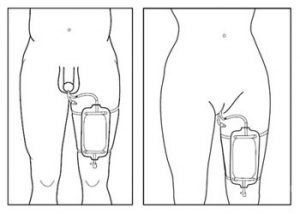A nurse is reinforcing teaching about disease management with a client who has GERD.
Which of the following statements should the nurse make?
"You should eat three large meals and two snacks per day."
"You should lay down for 1 hour following a meal."
"You should elevate the head of the bed while sleeping."
"You should only drink 2 cups of coffee per day."
The Correct Answer is C
Elevating the head of the bed while sleeping is a recommended strategy for managing GERD (gastroesophageal reflux disease). By raising the head of the bed, gravity helps to prevent stomach acid from flowing back into the esophagus, reducing the likelihood of acid reflux and associated symptoms.
"You should eat three large meals and two snacks per day" is not recommended for GERD management. Instead, it is advised to have smaller, more frequent meals throughout the day to reduce the pressure on the stomach and minimize the likelihood of acid reflux.
"You should lay down for 1 hour following a meal" is not recommended for GERD management. It is advised to avoid lying down immediately after meals, as this can increase the risk of acid reflux. It is generally recommended to wait at least 2 to 3 hours before lying down.
"You should only drink 2 cups of coffee per day" is a specific recommendation related to caffeine intake, which can potentially trigger or worsen GERD symptoms in some individuals. However, this statement alone does not encompass the comprehensive dietary recommendations for managing GERD.
Nursing Test Bank
Naxlex Comprehensive Predictor Exams
Related Questions
Correct Answer is ["C"]
Explanation
A: The tubing should not be coiled on the bed, especially not above the collection bag, as this can interfere with the drainage of urine and increase the risk of infection.
B: The drainage bag should always be kept below the level of the bladder during ambulation to prevent backflow and reduce the risk of infection.
C: Securing the catheter tubing to the lower abdomen (for male clients) or thigh (for female clients) helps to reduce the risk of catheter displacement and trauma. Proper securing also prevents unnecessary tension on the tubing, which can cause urethral irritation.
D:A sterile specimen should be collected from the sampling port of the catheter tubing, not directly from the drainage bag, which could lead to contamination.

Correct Answer is C
Explanation
During an external chemical disaster, it is crucial to minimize the exposure of clients to the hazardous substance. Moving clients to a room above ground level with few windows can help reduce the risk of exposure to the chemical and its fumes. This is because many hazardous chemicals tend to be denser than air and may settle closer to the ground. Choosing a room above ground level and with fewer windows can provide a safer environment.
Turning on fans in the facility to circulate air can actually worsen the situation by spreading the chemical and its fumes throughout the facility, potentially exposing more individuals.
Covering the electrical outlets with wet towels is not directly related to preparing for an external chemical disaster. It may be more relevant during a fire emergency to prevent the spread of flames, but not for chemical exposure.
Opening the fireplace dampers in the day room can allow the entry of outside air and potentially introduce more of the hazardous substance into the facility.
Whether you are a student looking to ace your exams or a practicing nurse seeking to enhance your expertise , our nursing education contents will empower you with the confidence and competence to make a difference in the lives of patients and become a respected leader in the healthcare field.
Visit Naxlex, invest in your future and unlock endless possibilities with our unparalleled nursing education contents today
Report Wrong Answer on the Current Question
Do you disagree with the answer? If yes, what is your expected answer? Explain.
Kindly be descriptive with the issue you are facing.
